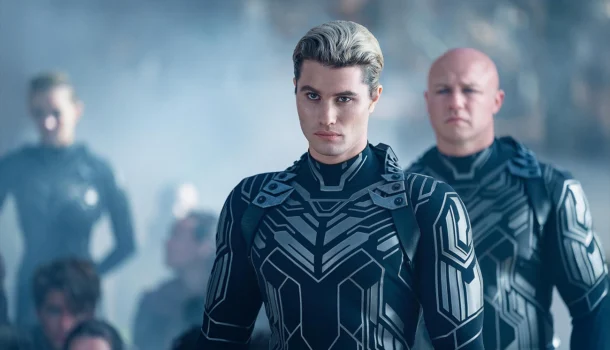The seduction of perfection is rarely neutral. In “Uglies”, the illusion of the aesthetic ideal becomes a brutal mechanism of social control, where standardized beauty is not an achievement, but a tool of oppression. Published in 2005, Scott Westerfeld’s novel not only cemented its place among the prominent works of young adult science fiction, but also carved an open wound in contemporary culture: the collective numbness toward the horrors of normativity. As it transitions from literature to film under McG and Netflix, Westerfeld’s dystopia gains new layers — more visual, but no less critical. The adaptation stretches the boundaries of aesthetics and free will with an urgency fit for the digital era.
The narrative machinery revolves around Tally Youngblood, played by Joey King, a character initially docile, molded to wait for — and crave — her plastic surgery at 16, a rite of passage to join the “Pretties.” Youth, in this universe, is merely a malformed interval to be corrected. Tally accepts this logic without resistance, driven mainly by the promise of reuniting with Peris, a friend already transformed. But the failure of this reunion sparks the first crack in the system’s logic. Rather than submit unquestioningly, Tally begins a path of friction with the dominant discourse, a kind of moral and existential peeling.
The appearance of Shay, played by Brianne Tju, not only disrupts Tally’s path but detonates her belief in the surgery’s promise of salvation. Through Shay, the viewer is invited to discover that bodily transformation masks a darker mutation: the erosion of will. What’s at stake is not a new face, but a reprogrammed mind — malleable and stripped of resistance. The surgery does not represent a choice; it is an imposition disguised as desire. And that is the system’s true perversity: to infiltrate individual aspirations until they become indistinguishable from coercion.
By laying this machinery bare, the film doesn’t stop at aesthetic critique. It precisely targets the mechanisms of social domestication operated through technology. The standardization of bodies functions as a distraction from something deeper: the erasure of autonomy. Beauty here is not a trait, but a symptom. The true aim of biotechnology is not to allure, but to subjugate. When Tally glimpses this truth, she sheds passivity and takes on a role of defiance — riddled with ambivalence and ethical dilemmas that make her more human, not a hero.
The interplay between desire and domination is the nerve center of the plot, and it’s within this tension that the film holds its ground. The promise of belonging, conveyed by the aesthetic ideal, reveals itself as a psychic trap. Conformity is masked as empowerment when, in fact, it’s a controlled detour from freedom. Westerfeld eerily anticipates the numbing effects of a world governed by perfection metrics, where difference is cut out as error and subjectivity becomes noise to be silenced.
The visual language of the adaptation strengthens this denunciation, drawing on a sanitized future where beauty is homogeneous and therefore stripped of uniqueness. The futuristic aesthetic doesn’t embellish — it unsettles. The sameness of faces, the symmetrical architecture, and the restrained gestures don’t build a paradise — they expose a prison of appearances. The film, without being didactic, plants questions that bloom slowly: why do we long for an ideal that hollows us out? What do we lose when we trade authenticity for acceptance?
By rejecting a preachy tone, the narrative retains its critical power. It speaks to a young audience but never underestimates them. On the contrary, it provokes them with questions that creep in between the lines: who benefits from the cult of perfection? How is the desire for a body that isn’t ours constructed? The world of “Uglies” isn’t far off — it’s merely an extrapolation of the present, where digital filters, algorithms, and cosmetic procedures are already reshaping bodies and subjectivities in real time.
In the end, there is no apotheosis, no simplified redemption. There is unease. Tally’s journey is less about defeating a system than about realizing that freedom begins when one dismantles the desire for what the system offers. In this sense, “Uglies” is a fable that exposes the fractures of late modernity: in our quest for perfection, we are becoming copies of one another. Individuality, reduced to an inconvenient noise, risks being erased not by tyrants, but by mirrors.
Film: Uglies
Director: McG
Year: 2024
Genres: Action/Drama/Adventure
Rating: 8/10

